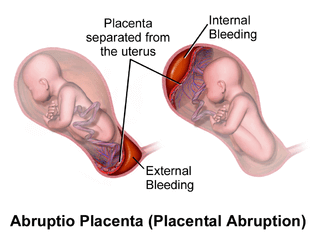The placenta is a structure that develops during the early stages of pregnancy. It attaches to the uterine wall and is the connection between the umbilical cord and the mother's circulation through which the fetus receives all of its nourishment and its oxygen. The health and survival of the fetus depends on the placenta remaining attached to the uterus. In a normal birth situation, the mother carries the fetus to term, which is considered to be 40 weeks of gestation. Then there are three stages of labor:
Stage One: The onset of labor until the cervix is fully dilated at 10 centimeters.
Stage Two: From the time the cervix is dilated until the baby is born.
StageThree: The delivery of the placenta.
 When there is a placental abruption, the placenta breaks away from the uterus prior to birth, sometimes prior to the onset of labor. If not recognized and treated immediately, the life of both the mother and baby may be in jeopardy.
When there is a placental abruption, the placenta breaks away from the uterus prior to birth, sometimes prior to the onset of labor. If not recognized and treated immediately, the life of both the mother and baby may be in jeopardy.
Risks of Developing Placental Abruption
Although placental abruption is rare, occurring in fewer than one percent of all pregnant women, it does happen and women need to know it can happen to them. Some risk factors are:
- Smoking and drug use.
- Diabetes.
- Women over 40.
- Past history of multiple pregnancies and life births.
- Multiple fetuses in the current pregnancy.
- High blood pressure.
Women need to be honest with their physicians and make sure the physicians are aware of all the relevant medical history. Women need to keep all of their prenatal appointments and comply with all instructions. They need to know danger signs and when they need to seek immediate, emergency medical treatment.
Placental Abruption Symptoms
Often, when a baby is at more than 30 weeks gestation or even at full term, the first sign the mother experiences is a sudden and severe pain in her back winding around to her abdomen. Vaginal bleeding begins shortly after and may be in large quantities. On the other hand, If the blood is trapped in the uterus by the placenta, bleeding may be nonexistent or only slight. Rapid contractions begin shortly thereafter with uterine pain. Abnormalities will be detected in the fetal heart rate.
Placental abruption can also occur early in the pregnancy. Symptoms may not be profound, such as only slight discomfort and a little bleeding due to only a partial detachment and not a full abruption. The fetus may not be growing normally and there may be other indications of stress.
When the aburuption is sudden, if not promptly recognized, diagnosed and treated, the outcome can be critical and even fatal for both baby and mother. Some serious consequences suffered by the mother may include:
- Severe blood loss with blood clotting problems.
- Shock due to the blood loss.
- Failure of body systems due to blood loss.
- Death due to blood loss.
If the mother survives the placental abruption, and the baby is born, bleeding may still continue at the uterine site from which the placenta detached. An emergency hysterectomy may be required to save the life of the mother.
Consequences to the baby due to the abrupt detachment of the placenta include:
- Loss of oxygen and nutrients.
- Premature birth.
- Birth injuries and brain damage resulting in cerebral palsy and other anomalies due to oxygen deprivation.
- Death
Placental Abruption Treatment
The placenta cannot be reattached to the uterine wall. The condition can only be monitored and whether it is a partial or complete abruption and what the stage of the pregnancy depends on how it is treated.
If a health care provider notices signs or symptoms of possible loosening of the placenta from the uterine wall, there are tests that can be done to confirm this, such as an ultrasound. A negative ultrasound does not mean there is no abruption, but a positive one will show its location. Blood tests may be taken to determine the source of the vaginal bleeding.
If the rupture is developing slowly, and it would help the viability of the fetus to wait longer before delivery, the mother may be kept in the hospital on total bed rest under constant monitoring which includes fetal heart monitoring. If there is any change or the abruption is getting worse, the doctor will perform a cesarean section.
In most cases, the abruption occurs suddenly. Time is of the essence and mothers must get to the hospital immediately. An emergency Cesarean section may be the only hope of saving the life of both mother and baby.
How an Attorney Can Help
Not every case of placenta abruption that has an unfortunate result for the mother or baby or both of them is due to medical malpractice. It depends upon the unique circumstances of each individual case. An attorney will gather all the facts of your case, review your medical records and determine if it appears that that the health care provider failed to comply with the standard of care within the community. If so, you may be entitled to collect for your damages or more information.

